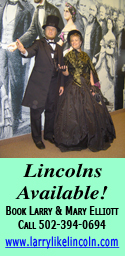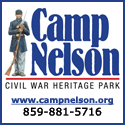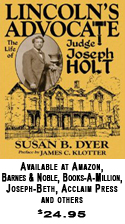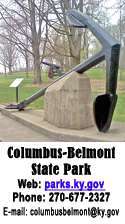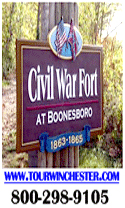|
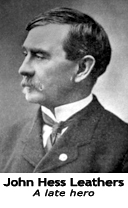 Some Civil War veterans became heroes Some Civil War veterans became heroes
much later – after war was concluded
By BRYAN BUSH
Bugle Staff Writer
Confederate Major John Hess Leathers was a Civil War champion of a different sort. He was a hero with a heart of gold.
Born in 1841 in Northern Virginia, Leathers was the son of a cabinetmaker and the youngest of seven children. While working for his father, he learned the skills of writing bills of sale, delivering invoices and keeping inventory, which would serve him well later in his life. By age 16, Leathers was working at a dry goods store in Martinsburg, Va.
In 1859, Leathers moved from Virginia to Louisville to work for his uncle, who was a local retail druggist. A year later, he became a bookkeeper in the wholesale clothing firm of William Terry & Co. When the Civil War broke out, Leathers decided to return home to Virginia and joined the 2nd Virginia Infantry, Stonewall Jackson’s brigade, part of Confederate General Robert E. Lee’s Army of Northern Virginia.
At the Battle of Gettysburg, Leathers received a severe wound. He decided his fighting career in the Civil War was over and, when he was well enough to travel, he returned to Louisville. In 1865, he joined the firm of Jones & Tapp and, in 1870, he became a partner and renamed the company to Tapp, Leathers and Company.
Throughout the 1870s and 1880s, Leathers managed the operations of the company and, by 1885, he had 500 employees and manufactured Kentucky jeans and lines of men’s and boy’s dress clothing for retailers throughout the country. On April 1, 1885, Theodore Harris moved his Louisville Banking Company to 5th and Market and hired Leathers to oversee the day-to-day operations of the Louisville Banking Company. Within three years, Leathers tripled the deposits of Louisville Banking and became head of Kentucky’s largest financial institution.
That’s when he began his journey as a Civil War hero.
Leathers became a wealthy man, but he used his money toward a multitude of philanthropic endeavors. He attended the Blue and Gray reunions at Gettysburg and, in 1913, he was appointed treasurer to help raise $500,000 to build the Gettysburg Peace Memorial. Because of his efforts in promoting peace after the war, the Army of the Potomac, an organization comprised of officers who served in the Union Army, made Leathers an honorary member. He became the only Confederate soldier to be given the honor.
Leathers was also founder of the Masonic Widows and Orphans Home and the Old Masons Home in Shelbyville. For 27 years, he was president of the old Louisville Industrial School, which, in 1920, was merged with the Parental Home into the Louisville and Jefferson County Children’s Home. He was also president of the Kentucky Humane Society and a member of the board of visitors at the Kentucky Military Institute.
The Civil War veteran also became president of the Confederate Association of Kentucky. The group’s promise was to “pay a decent respect to the remains and to the memory of those who die.” The organization raised $7,500, which went toward relief and memorial work and the Louisvillian gave serious consideration to help any Confederate veteran who was in need.
For example, ex-Confederate soldier Sgt. Billy Beasley came to Leathers in 1889 seeking help for his daughter and himself. Beasley was injured in the Battle of the Wilderness and barely could walk. Leathers gave him a $2 stipend to help him and his daughter, a free apartment for six months, and a $100 loan to open a cigar stand on the corner of Fifth and Market.
When Beasley died in 1898, Leathers personally met the hearse carrying Beasley’s casket at the entrance to Cave Hill Cemetery. Leathers paid for Beasley’s funeral, cemetery plot, floral arrangements and headstone.
Leathers continued to help his fellow ex-Confederate soldiers by becoming president of one of the largest United Confederate Veterans camps in the county. He also was instrumental in helping to establish a Confederate Veterans Home at 421 East Chestnut Street in Louisville.
On June 29, 1923, Leathers’ long career in business and philanthropy came to an end. He was survived by his wife Katie Armstrong and his three sons, Charles, John and Stuart.
He was laid to rest in Cave Hill Cemetery in the Confederate section.
|



